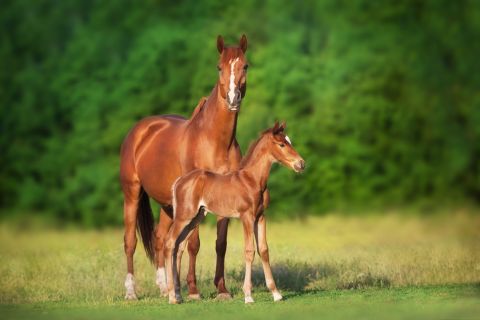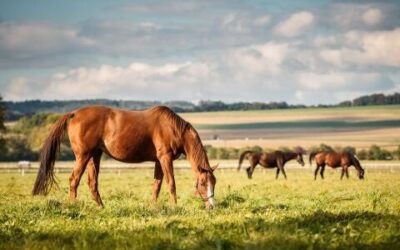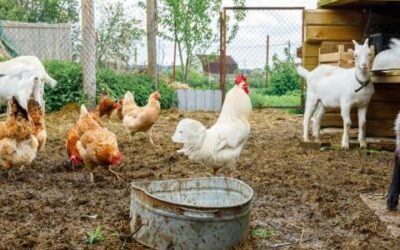
Raising foals is a rewarding but delicate task that requires careful attention to their nutritional needs. As these young horses transition from nursing to solid food, their diet plays a pivotal role in their growth, development, and overall well-being. In this guide, we’ll explore essential aspects of feeding growing foals to ensure they embark on a healthy journey into adulthood.
Early Days: The Importance of Colostrum
The foundation of a foal’s health is laid in the first hours of life through colostrum, the nutrient-rich, antibody-packed first milk produced by the mare. Colostrum provides essential antibodies, vitamins, and minerals that are crucial for the foal’s immune system and overall development. It is imperative that foals nurse within the first few hours of birth to receive these vital nutrients.
Transition to Solid Food
As foals grow, their nutritional needs evolve. Typically, foals start nibbling on solid food when they’re between two to four weeks of age. The weaning process, where they transition from solely relying on their mother’s milk to a combination of forage and concentrate feed, usually begins around four to six months of age. Here are key considerations during this transition:
1. Quality Forage:
Introduce high-quality forage, such as timothy hay or alfalfa, to foals gradually. Providing good-quality forage ensures they receive essential fiber, which is crucial for proper digestion and gut health. The forage should be free from dust, mold, and contaminants to avoid respiratory and digestive issues.
2. Concentrate Feed:
A well-formulated foal concentrate feed is essential to meet their nutritional requirements. Foal feeds provide the necessary balance of protein, energy, vitamins, and minerals for growing youngsters. Start with small amounts and increase them gradually as the foal matures.
3. Monitoring Growth Rates:
Monitoring the growth rate of foals is crucial to ensuring they receive adequate nutrition. Rapid or stunted growth can indicate imbalances in the diet. Consult with a veterinarian or equine nutritionist to establish appropriate feeding practices based on the specific needs of your foal.
4. Balancing Nutrients:
Foals have specific nutrient requirements, including protein, calcium, phosphorus, and trace minerals, to support their growing bones, muscles, and overall development. A balanced concentrate feed designed for foals is a key component of meeting these nutritional needs.
5. Water Consumption:
Adequate water intake is fundamental for proper digestion and overall health. Ensure foals always have access to clean, fresh water. Pay attention to water temperature, especially during extreme weather conditions, to encourage consistent drinking.
Weaning Process
Weaning is a critical phase in a foal’s life that requires a gradual transition from dependence on the mare’s milk to independent feeding. Consider the following tips for a smooth weaning process:
1. Gradual Separation:
Gradually reduce the time the foal spends with the mare, starting with short separations and gradually extending them. This allows both the mare and foal to adjust emotionally and reduces stress during the weaning process.
2. Provide Socialization:
Foals are social animals, and abrupt separation can cause stress. If possible, allow foals to have visual and physical contact with other horses during the weaning process. This alleviates feelings of isolation.
3. Maintain Consistent Nutrition:
Ensure that foals continue to receive a nutritionally balanced diet during and after weaning. Monitor their weight, growth, and overall health to identify and address any nutritional imbalances promptly.
4. Patience and Observation:
Weaning is a gradual process that requires patience. Observe the behavior of both the mare and foal during and after separation. Address any signs of distress or nutritional deficiencies promptly.
Considerations for Special Cases
1. Orphaned Foals:
Orphaned foals require special attention to replicate the care provided by a mare. Consult with a veterinarian or equine nutritionist to develop a suitable nutrition plan that includes milk replacers, appropriate forage, and concentrate feeds.
2. Stunted Growth or Malnutrition:
Foals that have experienced stunted growth or malnutrition may require additional care and a carefully formulated diet. Collaborate with equine professionals to develop a rehabilitation plan that addresses their specific nutritional needs.
Feeding growing foals is a dynamic process that requires attention to their changing nutritional requirements as they transition from nursing to independent feeding. By providing high-quality forage and balanced concentrate feed and closely monitoring their growth and overall health, you can contribute to the development of healthy, thriving young horses. Consulting with equine professionals, including veterinarians and nutritionists, is crucial to tailoring a feeding program that meets the individual needs of your foals. You can ensure they embark on a journey to adulthood with strength and vitality.
When it comes to feeding growing foals, Lucerne Farms understands how complicated the process can be. From proper nutrition to weaning, foals have unique needs that you must meet to ensure their vitality and long-term well-being. By partnering with Lucerne Farms, you’ll have full access to professionals who understand the latest foal feeding guidelines so that you can raise your farm animals right.




